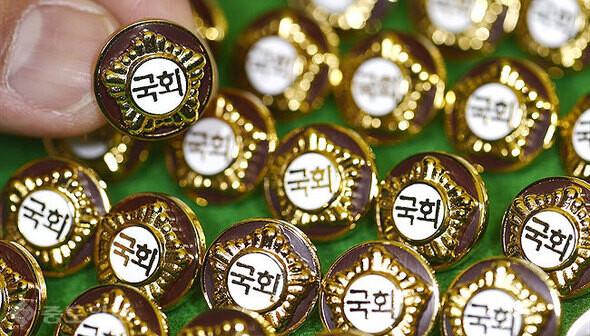hankyoreh
Links to other country sites 다른 나라 사이트 링크
Distrust of politicians creates “crisis of representation” in South Korea

According to a new study, democracy in South Korea is facing a “crisis of representation” resulting from distrust of politicians, but this has not yet brought a “crisis of participation,” as evidenced by increasing voting turnout.
On Oct. 11, the Korea Research Association, an association of polling organizations, held a seminar titled “South Koreans: Their Present and Future” at the Riverside Hotel in Seoul.
“Voters’ attitudes toward politics conflict with their actual political behavior,” said Kim Chun-seok, director of Hankook Research, in a keynote address, called “Changes in South Koreans‘ Political Attitudes,” which analyzed the results of political and election polls over the past decade.
Kim’s analysis found an abysmal level of trust in the National Assembly and political parties - less than half of that given to chaebol, labor unions and the police, which already have low trust ratings. From the 2007 presidential election until the general election on Apr. 13 of this year, nine out of 10 polled voters expressed strong distrust in politicians, citing considerable differences between their behavior before and after elections. The level of trust in the government was also 25%, which was much lower than the OECD average of 43% (as of 2014).
But despite this distrust, voter turnout in nationwide elections (including presidential elections, general elections and local elections) is continuing to rise. While voter turnout in the presidential election fell from 70.8% in 2002 to 63% in 2007, it jumped to 75.8% in 2012. In the general election, turnout has risen from 46.1% in 2008 to 54.2% in 2012 and 58% in 2016; in the local elections, it has increased from 51.6% in 2006 to 54.5% in 2010 and 56.8% in 2014.
Kim concluded that the reason for this is the fact that voters are paying more attention to the quality of candidates and their campaign pledges than to political parties. As voters see how their lives are affected by the outcome of elections, they vote for candidates whose pledges suit their own interests, he said.
Kim believes that another factor is a psychological tendency to curb the party in power, with voters using elections to cast judgment on political parties that have monopolized control over the government and to give another party a chance to rule. He has observed that voters often swing back and forth between the progressives and conservatives: when national elections are held under a progressive government, they usually side with the conservatives, whereas when the conservatives have been in power for a long time (such as during the general election on Apr. 13 of this year), they vote for the progressives.
“Since voters have the ability and the will to exercise their right as democratic citizens to participate in politics, the political establishment needs to acquire the leadership to overcome the ‘crisis of representation,’” Kim said.
By Kim Nam-il, staff reporter
Please direct questions or comments to [english@hani.co.kr]

Editorial・opinion
![[Guest essay] Preventing Korean Peninsula from becoming front line of new cold war [Guest essay] Preventing Korean Peninsula from becoming front line of new cold war](https://flexible.img.hani.co.kr/flexible/normal/500/300/imgdb/original/2024/0507/7217150679227807.jpg) [Guest essay] Preventing Korean Peninsula from becoming front line of new cold war
[Guest essay] Preventing Korean Peninsula from becoming front line of new cold war![[Column] The state is back — but is it in business? [Column] The state is back — but is it in business?](https://flexible.img.hani.co.kr/flexible/normal/500/300/imgdb/original/2024/0506/8217149564092725.jpg) [Column] The state is back — but is it in business?
[Column] The state is back — but is it in business?- [Column] Life on our Trisolaris
- [Editorial] Penalties for airing allegations against Korea’s first lady endanger free press
- [Editorial] Yoon must halt procurement of SM-3 interceptor missiles
- [Guest essay] Maybe Korea’s rapid population decline is an opportunity, not a crisis
- [Column] Can Yoon steer diplomacy with Russia, China back on track?
- [Column] Season 2 of special prosecutor probe may be coming to Korea soon
- [Column] Park Geun-hye déjà vu in Yoon Suk-yeol
- [Editorial] New weight of N. Korea’s nuclear threats makes dialogue all the more urgent
Most viewed articles
- 1[Guest essay] Preventing Korean Peninsula from becoming front line of new cold war
- 2Yoon’s broken-compass diplomacy is steering Korea into serving US, Japanese interests
- 360% of young Koreans see no need to have kids after marriage
- 4[Reporter’s notebook] In Min’s world, she’s the artist — and NewJeans is her art
- 5After 2 years in office, Yoon’s promises of fairness, common sense ring hollow
- 6S. Korean first lady likely to face questioning by prosecutors over Dior handbag scandal
- 7AI is catching up with humans at a ‘shocking’ rate
- 8[Column] The state is back — but is it in business?
- 9[Column] Why Korea’s hard right is fated to lose
- 10‘Weddingflation’ breaks the bank for Korean couples-to-be